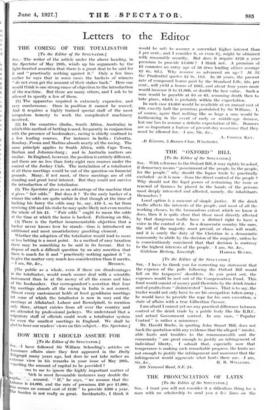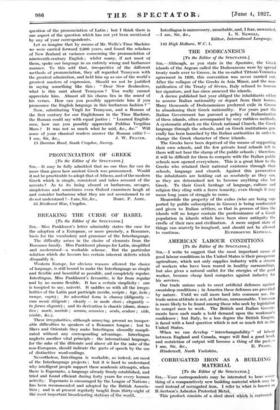THE PRONUNCIATION OF LATIN [To the Editor of the Srm-r.s.rort.]
Sut,--I trust you will not consider it a ridiculous thing for -a man with no scholarship to send you at feu lines on the
question of the pronunciation of Latin ; but I think there is one aspect of the question which has not yet been mentioned by any of your correspondents.
Let us imagine that by means of Mr. Wells's Time Machine we were carried forward 2,000 years, and found the scholars of New Zealand at variance concerning the pronunciation of nineteenth-century English ; whilst many, if not most of them, spoke our language in an entirely wrong and barbarous manner. To this add that, irrespective of the different methods of pronunciation, they all regarded Tennyson with the greatest admiration, and held him up as one of the world's greatest masters of expression. Should we not be justified in saying something like this : " Dear New Zealanders, what is this cant about Tennyson ? You really cannot appreciate him. Almost all his charm lies in the sound of his verses. How can you possibly appreciate him if you pronounce the English language in this barbarous fashion ? "
Now, substituting Virgil for Tennyson, and a Roman of the first century for our Englishman in the Time Machine, the Roman could say with equal justice " Learned English- men, how can you possibly appreciate Publius Vergilius Maro ? It was not so much what he said, &c., &c." Will some of your classical readers answer the Roman critic ?-
I am, Sir, &e., J. W. FEASTER. 15 Dornton Road, South Croydon, Surrey.







































 Previous page
Previous page